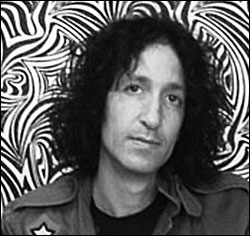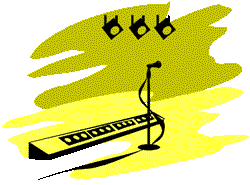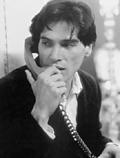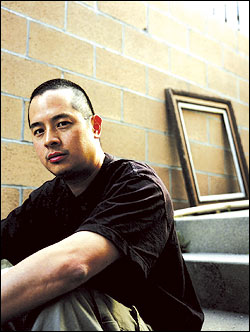BY HIS OWN COUNT, Gordon Raphael has been in 31 bands. If we are to go by the public record, that’s 26 more than the number of bands all five members of the Strokes have been in combined. Raphael moved here with his family in 1965, at age 8, and began playing keyboards that year and tinkering with four-track recorders as a teenager. Though he’s devoted his life to musiche claims to have had precisely one nonmusic-related job in his adulthoodRaphael recently switched majors. He’s still a keyboardist, and leads a new group called Crystal Radio from his new home in London. But he’s become better known for his studio prowess, most notably as the producer of both albums by the Strokes. In a time when mainstream rock is the domain of digital bludgeoners, the fuzzy-yet-distinct style on both Strokes albums marks Raphael as a back-to-basics guy who isn’t afraid to get his handsand your earsdirty.
Over the phone from his London flat (I call him at 8 a.m. his timerock and roller or no, the man is an early riser), Raphael is excitable, extremely well mannered, and a little flighty. (“Is this the guy from Seattle? Oh, good!”) It’s easy to see why he left the city. His forthright ambition and his encouragement of it in others (“[Strokes frontman] Julian [Casablancas] will do whatever it takes for his career, and that’s an admirable goal”) is quite at odds with the bulk of Seattle’s rock scene, where overt careerism is frowned upon.
Raphael’s interest in the studio began when he was 19. “I didn’t think anyone would take my music seriously unless I could record it myself and show them the finished idea. I couldn’t afford my own four-track, so I wound up spending every single day in someone’s basement or garage.”
In the mid-’80s, Raphael tried to convert an abandoned Ballard church into what he describes as “a cultural arts center for rock and roll. It was a very chaotic place. We threw a big rent party, had live rock bands playing, and 300 under-18 punk rockers showed up with cases of beer, using every other drug under the sun. The neighbors called the police, who were telling me if I didn’t get that beer out of the building, I was going to be fined $50 for every underage person there. From there, I promise you, things just degenerated.” A year later, the building burned down, which Raphael discovered when he showed up to band practice greeted by the sight of “a crowd of neighbors looking in, celebrating that the problem was gone.”
After a fruitless stint in New York, Raphael moved to Hollywood and became involved with an indie label called World Domination, run by ex-Gang of Four member Dave Allen and former Beastie Boys/Nirvana manager Ron Stone. After a falling-out with Allen, Raphael returned to Seattle, where he was asked to fill in on keyboards for a fledgling, theatrical psychedelic band called Sky Cries Marywhose demo had already piqued Raphael’s interest in L.A. “Within three months of my joining, Dave Allen heard a new demo and decided to sign us,” he says. “I decided it was better to get a record deal and live my dream than to carry on the fight.” Sky Cries Mary was big in their hometown”We could sell out the Moore Theater regularly,” Raphael recallsbut their popularity failed to translate nationwide, and after a less-than-charmed tenure on Warner Bros. the band split in the late ’90s.
Raphael tried New York again, this time with better success, becoming a partner in a charmingly named Lower East Side studio, Chateau Relaxo. After a few lean months, his reputation as a cheap, flexible soundman made him a go-to guy for the budget-minded. Later he moved to another studio, dubbed the Transporterraum, and hustled for more work, including a 2000 performance by an ambitious quintet called the Strokes.
Raphael figured he’d be done with them sooner rather than later. “We recorded three songs in three days for a quick $600 so I could [afford to] go to a Sky Cries Mary reunion party in Seattle the next week,” says Raphael. Immediately, he was impressed by the band’s work ethic. “At first, I thought Julian Casablancas was just a guy who drank beer and had a bad attitude, but as I worked with him, I realized I’d better listen closely when he makes a suggestion, because he seems to have very special ears.” When the demo was issued by the British label Rough Trade as The Modern Age EP, and named Single of the Week in London pop-mag NME, Raphael was floored. “It was catching firethey were even written about in Rolling Stone, pictures and articles, for a band that wasn’t even signed in America yet.” Since Raphael had produced the EP for a flat fee, without any share of sales, he figured that was the last he’d hear from the band. “Then I got a call from Julian.”
Despite being served a second eviction notice during its making, Raphael produced Is This It in a month; the album went gold and placed second in the Village Voice‘s 2001 critics’ poll. Raphael was initially passed over for the follow-up. “Julian said, ‘We’ve decided to start the record with [famed Radiohead producer] Nigel Godrich as a test. I have the feeling we’ll be back working with you, but we want to see if we can get a better sound.’ I thought those were just kind words and I’d never hear from them again.” But as with Is This Itwhich the Strokes initially began with Pixies producer Gil Nortonthe band changed their minds and went back to Raphael, who flew back to New York from London, where he’d moved after the first album was recorded.
Raphael, a long-standing Anglophile, doesn’t have any plans to come back to Seattleor the U.S. He’s content in London, where he’s started a new label, Shoplifter, and where Crystal Radio has begun gigging regularly. “The story of Jimi Hendrix really struck home with me,” he says. “I thought, ‘I’m from Seattle, and I play weird music. Maybe if I go to England, my life will change.'” And it did.








